There were no headlines back then. No CNBC segments. Just a few hand-typed letters were sent to his small group of investors. But inside those letters? These letters provide a masterclass in long-term thinking, discipline, and how to understand money truly.
Buffett wasn’t trying to impress anyone. He was just trying to be right.
These letters reveal not just what he invested in, but how he thought — and that makes all the difference. Because the real game of investing isn’t played in the stock market. It’s played in the mind.
Here are some of the most powerful ideas from those early years — insights that shaped Buffett long before the spotlight ever found him.
The crowd is often wrong – And that’s okay
In 1958 and again in 1961, Buffett made it clear: just because “everyone’s doing it” doesn’t mean it’s smart.
Back then, retail investors were flooding into the market. Stocks were the new craze. But Buffett resisted the noise. He reminded his partners that even when the market feels like a stampede, it’s not about being part of the crowd — it’s about having conviction in your own analysis.
He wrote, “You will not be right simply because a large number of people agree with you.” Being right, for him, meant standing apart when needed, not because you wanted to be contrarian, but because you trusted your homework.
This wasn’t arrogance. It was independence. And in investing, that’s rare.
It’s better to miss out than to blow up
In 1959, Buffett issued a quiet warning amidst widespread optimism. He had seen what happens when people believe the rules have changed — that the market will only go up, and that fundamentals no longer matter.
He called it “New Era” thinking, and he wanted no part of it.
Instead, he preferred to stay cautious. He was willing to remain cautious, even if it meant remaining on the sidelines during a temporary rally. “It’s better to be conservative,” he explained, “and miss out on a little upside than get swept up in the hype and suffer permanent loss.”
This kind of thinking might seem boring. But Buffett wasn’t aiming to be exciting. He was aiming to be wealthy—and stay that way.
Real performance isn’t about how much you make, It’s about when
One of Buffett’s sharpest observations came in 1960, when he compared two types of investment years.
In one year, his fund returned 15% while the overall market crashed 30%. In another year, both his fund and the market gained 20%. Most investors would celebrate the second. Buffett preferred the first.
Why? Because in the first year, he added real value. He protected capital when others were losing it. That’s what real outperformance looks like – not just beating a benchmark, but doing it when it’s hard.
Anyone can look smart in a bull market. But it’s how you play when things go wrong that really shows your skill.
Don’t be afraid to look wrong
By 1965, Buffett’s investing style was becoming clear – and unapologetically different. While others chased hot stocks and growth fads, he was buying overlooked companies, often at massive discounts.
Sometimes he paid just 40 or 50 cents for every dollar of value. The companies weren’t glamorous. Some were downright dull. But they had strong balance sheets, consistent cash flows, and room for growth.
People didn’t always understand his picks. That didn’t bother him.
What mattered was the margin of safety. If he could buy something worth a dollar for 50 cents, and the downside was limited, he didn’t need the market’s approval. He needed time. And eventually, time always sided with the fundamentals.
It’s not about when, it’s about what
In 1966, Buffett ended the year with a line that would become one of his most enduring principles:
“The course of the stock market will determine, to a great degree, when we will be right, but the accuracy of our analysis will largely determine whether we will be right.”
In simple terms, you can’t control timing. The market might not reward you immediately. But if your understanding of the business is correct, the payoff will come.
Most people obsess over predictions — when to enter, when to exit, and what the Fed will do next. Buffett didn’t care. He focused on understanding the business. If that part was right, the rest would follow.
Final thought
The letters Buffett wrote to his early partners weren’t filled with stock tips. They were filled with clarity.
He talked about patience. Discipline. Risk. Independent thinking. Most of all, he talked about the importance of knowing what you own, not just owning what’s popular.
He wasn’t trying to get rich quickly. He was trying to build something that lasted. And that’s exactly what he did.
So the next time you see the market swinging wildly or hear the next big stock everyone’s chasing, remember this: Buffett’s greatest wins didn’t come from excitement. They came from restraint.
(The author, Chakrivardhan Kuppala is the Cofounder & Executive Director of Prime Wealth Finserv)
(Disclaimer: Recommendations, suggestions, views and opinions given by the experts are their own. These do not represent the views of the Economic Times)















